Thuingaleng Muivah Returns Home After Six Decades, Receives a Historic Welcome in Ukhrul
MANIPUR
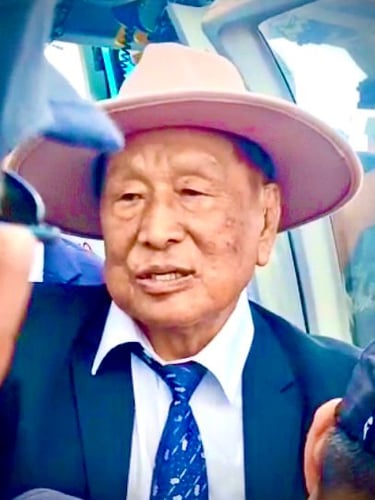

Ukhrul (Manipur): The Tangkhul Naga hills reverberated with emotion and solemn pride on Wednesday as Thuingaleng Muivah, the Ato Kilonser (Prime Minister) and chief political negotiator of the National Socialist Council of Nagalim (Isak-Muivah), set foot on his homeland after more than sixty years. The 91-year-old Naga leader, one of the most consequential figures in the history of the Naga political movement, was accorded a grand and heartfelt reception by thousands of well-wishers and supporters upon his arrival in Ukhrul town.
Image: Mr Th. Muivah, Ato Kilonser of NSCN IM
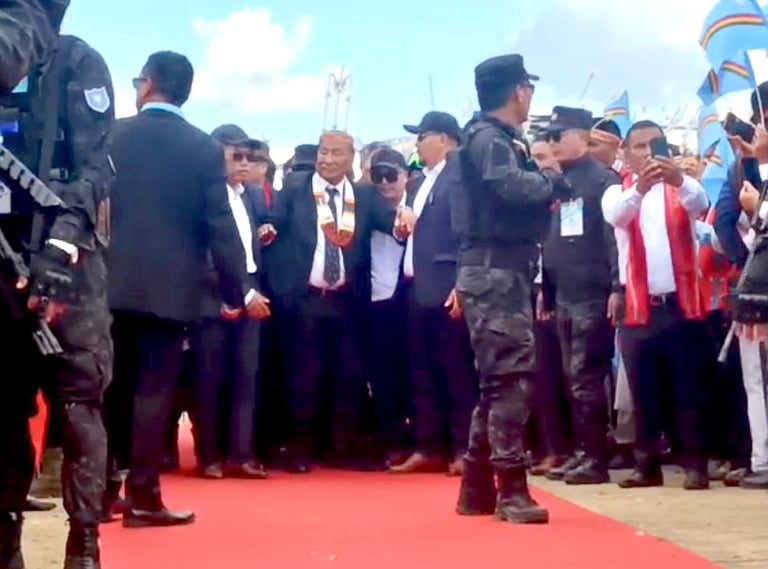

Image: Mr. Th. Muivah sets foot in Ukhrul after 6 decades of self exile fighting for the Naga cause


Image: Mr Muivah arrives in Ukhrul on broad a chopper
A helicopter carrying Mr. Muivah landed at the Ukhrul District Headquarters ground late in the morning. Despite his frail health, his presence drew a vast crowd of Tangkhuls and other Naga tribes, who had come to witness what many described as a “homecoming of history.” Traditional shawls, rhythmic drums, and the haunting echo of Naga folk songs filled the air as villagers lined the streets leading to the ground, holding banners that read “Welcome Home, Our Leader.”
From Ukhrul, Mr. Muivah was scheduled to proceed to his ancestral village Somdal, which he last left in 1964 when he embarked on what he described as his “revolutionary journey.” The visit, he said in his written message, was a return not just to his birthplace but to the soil that gave birth to the Naga movement itself.
A Message of Faith, Gratitude, and Resolve
Too weak to speak in person, Mr. Muivah’s written message was read aloud by NSCN (IM) senior leader, V.S. Atem, before the gathering at the Ukhrul playground. The message, running into several pages, was both a thanksgiving and a reflection — a deeply personal narrative tied to the collective journey of the Naga people.
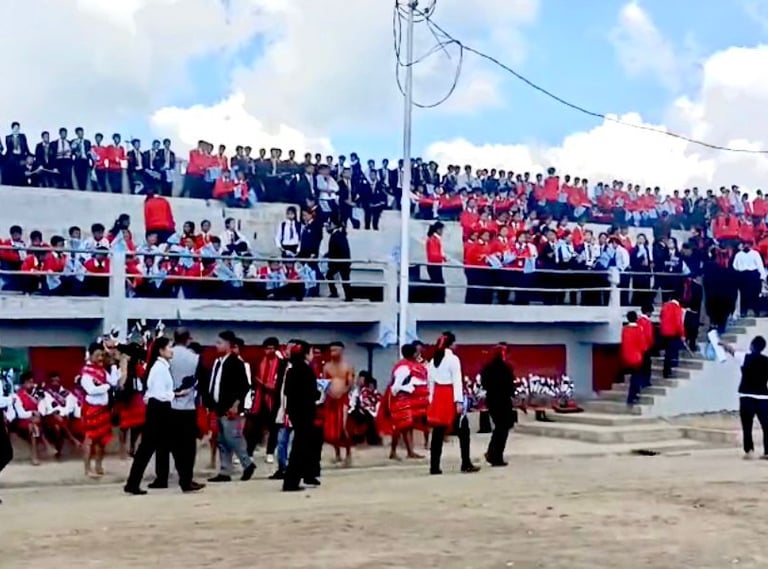

Image: People of Ukhrul waiting for Mr. Th. Muivah’s arrival
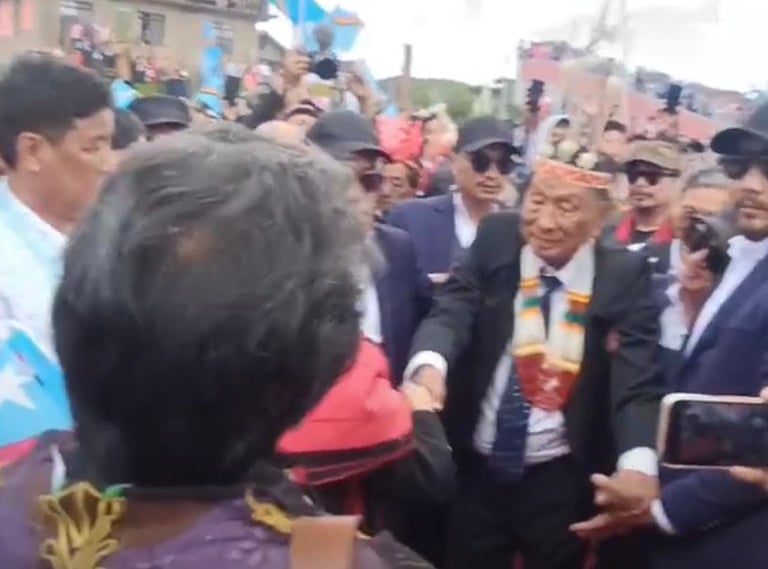

Image: Muivah greeted by his wife, Pakahao Ikres Muivah at Pakshi ground Hungpung, Ukhrul
“Greetings to the Naga people and Nagalim in the blessed name of our Lord and Savior Jesus Christ,” the message began. “It is a moment of great joy for me to be with you today. My revolutionary journey began six decades ago from here in Tangkhul country in 1964. I thank the Lord God Almighty for preserving me and making it possible for me to return to my birthplace today.”
Muivah spoke with reverence for the generations who had sacrificed their lives for the Naga cause. “Many people who I knew and who loved me are missing. Generations come and go, but nation stays. The issue we are fighting for is greater and older than most of us who are gathered here,” he said.
In his message, he extended gratitude to the various organizing committees, the National Socialist Council of Nagalim (NSCN), and both the Government of India and the Manipur Government for facilitating his visit. He also thanked the non-Naga people, civil society organizations, and church leaders who, he said, “stood in solidarity with the Naga political struggle.”
Referring to the long Indo-Naga political negotiations, he reaffirmed that “Nagalim that lies in the tri-junction of Burma, China, and India is a territory given by the Almighty God, and the Naga people have defended the sovereign existence of Nagalim for the past 79 years.”
“To defend this God-given birthright is the bounden duty of all Nagas, wherever they are. To despise it is a curse,” he declared.
The statement, deeply spiritual in tone, reflected Muivah’s lifelong conviction that the Naga struggle was not merely political, but divine — a covenant between the people and their faith.
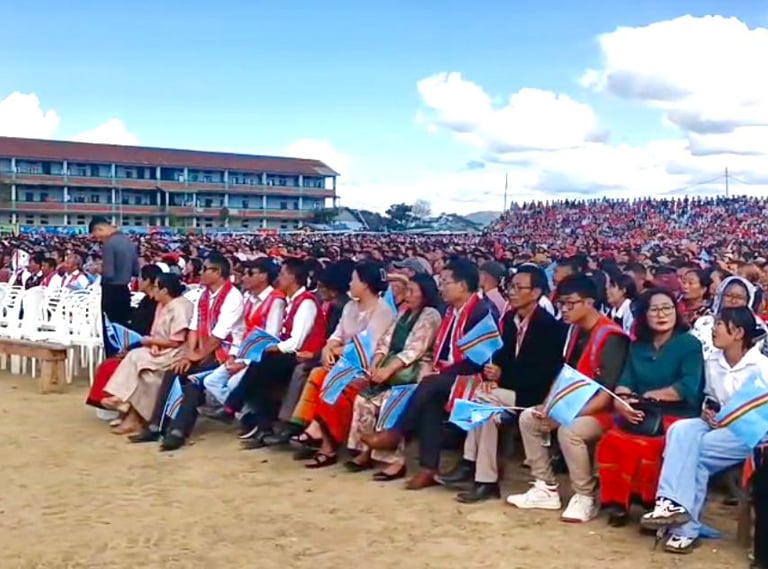

Image: Mr. Muivah accorded a hero welcome in Ukhrul district head quarter
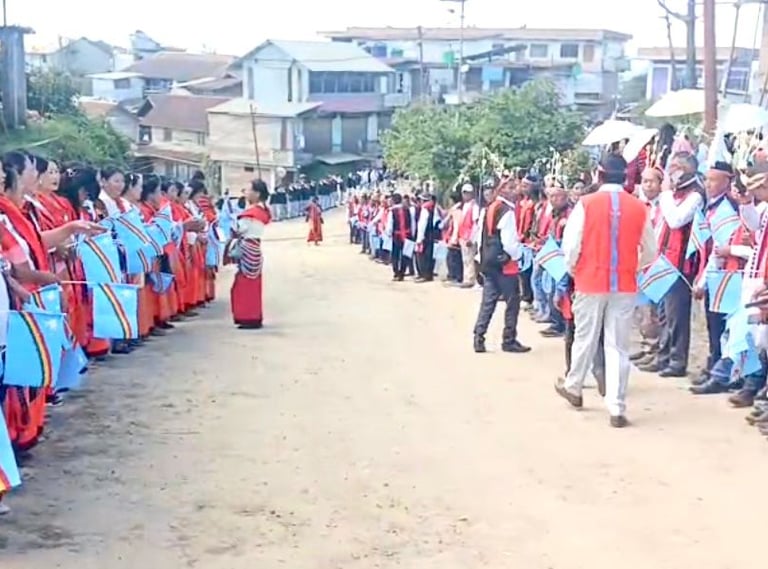

Image: People of Ukhrul waiting for Mr. Th. Muivah’s arrival
A Journey That Began in Somdal
Born in 1934 in the sleepy village of Somdal in Ukhrul district, Thuingaleng Muivah’s early life was marked by simplicity and intellectual pursuit. A graduate of St. Anthony’s College, Shillong, he was known for his sharp mind and strong sense of purpose. Drawn into the political ferment of the 1950s and 60s, Muivah joined the Naga National Council (NNC) under A.Z. Phizo, the first organized political front of the Naga movement.
He soon emerged as a prominent voice within the NNC, advocating for a sovereign and unified Nagalim. However, the 1975 Shillong Accord between a section of NNC leaders and the Government of India, which accepted the Indian Constitution without conditions, deeply divided the Naga movement. Muivah, along with Isak Chishi Swu and S.S. Khaplang, rejected the Accord and branded it a betrayal.
In 1980, the trio formed the National Socialist Council of Nagaland (NSCN) with the aim of continuing the armed struggle for Naga sovereignty. The group espoused a vision of a socialist and Christian Nagalim that would encompass all Naga-inhabited territories across present-day Nagaland, Manipur, Arunachal Pradesh, Assam, and parts of northwestern Myanmar.
After internal differences led to a split in 1988, Muivah and Isak Chishi Swu co-founded the NSCN (IM), which went on to become the most influential insurgent group in the region. Under their leadership, the NSCN (IM) transformed from a guerrilla outfit into a formidable political entity with a strong diplomatic presence and a disciplined armed wing.
Architect of the Peace Process
Despite years of armed confrontation with Indian security forces, Muivah’s leadership gradually shifted toward negotiation. In 1997, under his stewardship, the NSCN (IM) entered into a ceasefire agreement with the Government of India — a landmark decision that brought an end to decades of open hostilities.
Since then, Muivah has served as the chief political negotiator of the NSCN (IM) in the Indo-Naga peace talks. The negotiations, which have continued for more than two decades, culminated in the signing of the Framework Agreement on August 3, 2015, with Prime Minister Narendra Modi.
The Agreement recognized the “unique history and position of the Nagas” and laid the foundation for a possible political settlement within the Indian Union, though its details remain confidential. Muivah has repeatedly insisted that “the sovereignty of the Naga people lies with the people,” and that any solution must recognize their historical rights and dignity.
In his message read at Ukhrul, Muivah revisited this theme: “The ongoing Indo-Naga political peace process began as two sovereigns based on the principles that talks would be unconditional, at the highest level, and outside India in a third neutral country.”
He emphasized that the Framework Agreement and the earlier Amsterdam Joint Communiqué of 2002 “laid the foundation for an honourable negotiated political settlement” and that the recognition of Nagalim’s unique history “is an admission that the Indo-Naga conflict is not an internal matter of India.”
Legacy of a Relentless Leader
For his followers, Thuingaleng Muivah represents resilience, faith, and unbending will. His critics, however, see in him a figure of contradictions — a leader whose vision of “Greater Nagalim” has also been a source of tension among neighbouring states. Yet, even his opponents acknowledge that no understanding of Naga politics is complete without reckoning with Muivah’s influence.
He is, in many ways, the last living link to the early generation of Naga nationalists who took up arms in pursuit of self-determination. His style of leadership has combined theological conviction with revolutionary zeal, and his ability to sustain a movement through both war and negotiation speaks to his political acumen.
As he returns to Somdal — the village of his birth and the cradle of his dreams — Thuingaleng Muivah’s journey seems to have come full circle. To the Tangkhuls who welcomed him home, he is more than a political leader; he is a patriarch, a prophet-like figure who carried the banner of Naga identity across continents and decades.
In the quiet hills of Ukhrul, where church bells mingled with the chants of welcome, there was a palpable sense that history had paused — to witness an old warrior return home, not as a victor or a vanquished, but as a man who never stopped believing.
Video: Muivah lands at Ukhrul
